How Final Fantasy 15's spoiled royal camping trip was saved by the friends we made on the way
Opinion | "What these episodes and other additions in 2018's Royal Edition can't do, however, is complete the game"
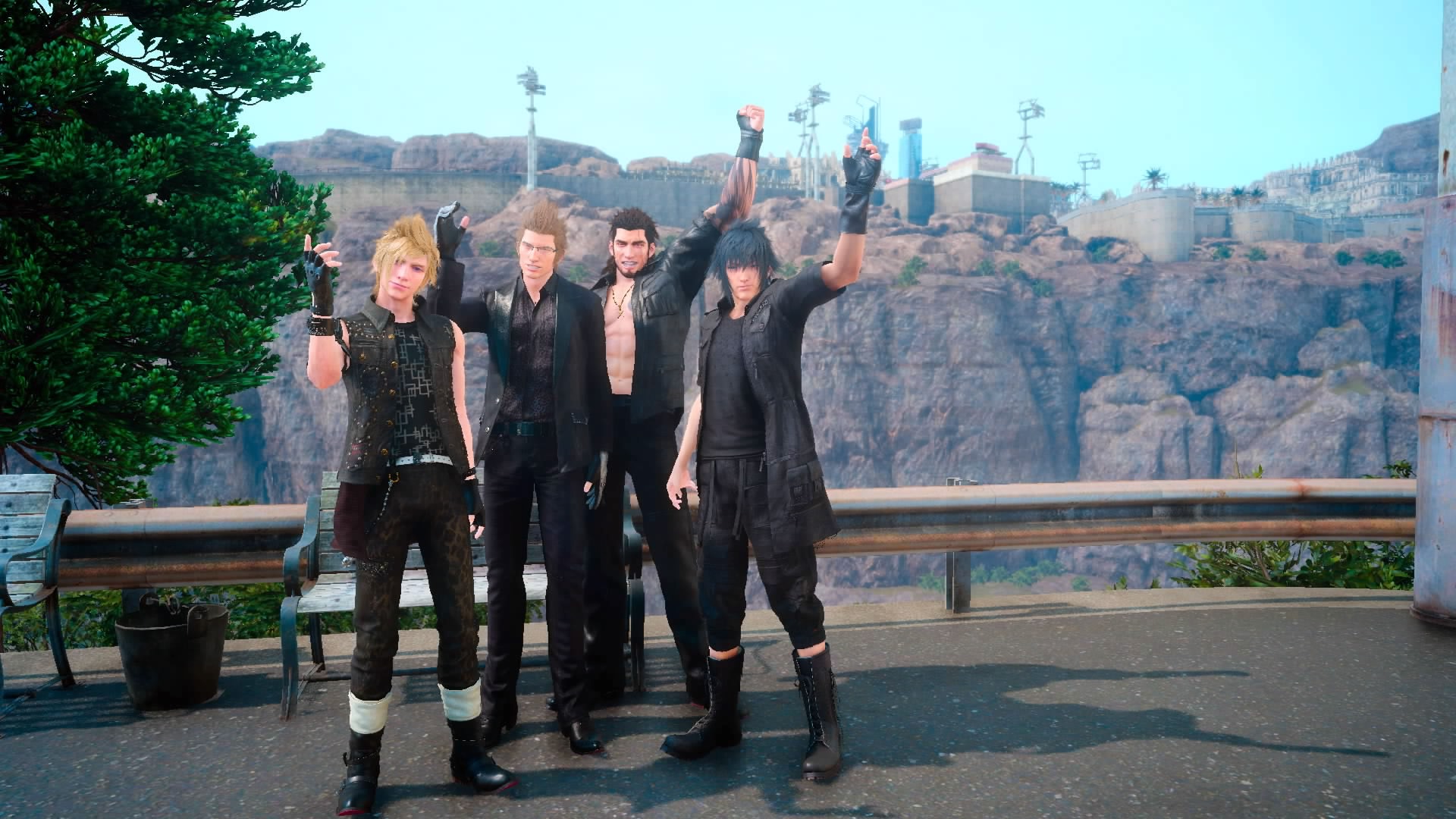
Cindy the mechanic looks like a Victoria's Secret model and speaks like an old-timer of the Gold Rush era. As the first NPC you meet out in the world of Final Fantasy 15, she sets the tone for a game of mismatches. Indeed, it's a surprise to encounter a 'Cindy' in a world where the main cast have names such as Noctis Lucis Caelum, Gladiolus Amicitia, and Lunafreya Nox Fleuret. Sure, Noctis is a prince and Lunafreya a princess and oracle, but it's not as though the game ever explores this disparity in syllables as a marker of status.
Rather, by the time you meet another NPC, Dave, a little later, it's more as though the support character designers ran out of enthusiasm once they'd finished rounding off Cindy's cleavage. Not that 'Dave' isn't a fine name, naturally, but it's hard to shake the sense that nobody gave much thought to him, or his moniker.
Forgettable as Dave might be, though, like Cindy he symbolises so much about Final Fantasy 15. As much as protagonist Noctis and his trio of chums – Gladiolus, Ignis and Prompto – represent everything in the game that's detailed and polished, Dave stands for all the bits that are under-designed, if not plain unfinished. The presence of Dave exemplifies an experience that's often good and bad simultaneously, and not in a way that evens out to average. Dave embodies the truth that Final Fantasy 15 will forever exist in a state of internal contradiction.
Final chance
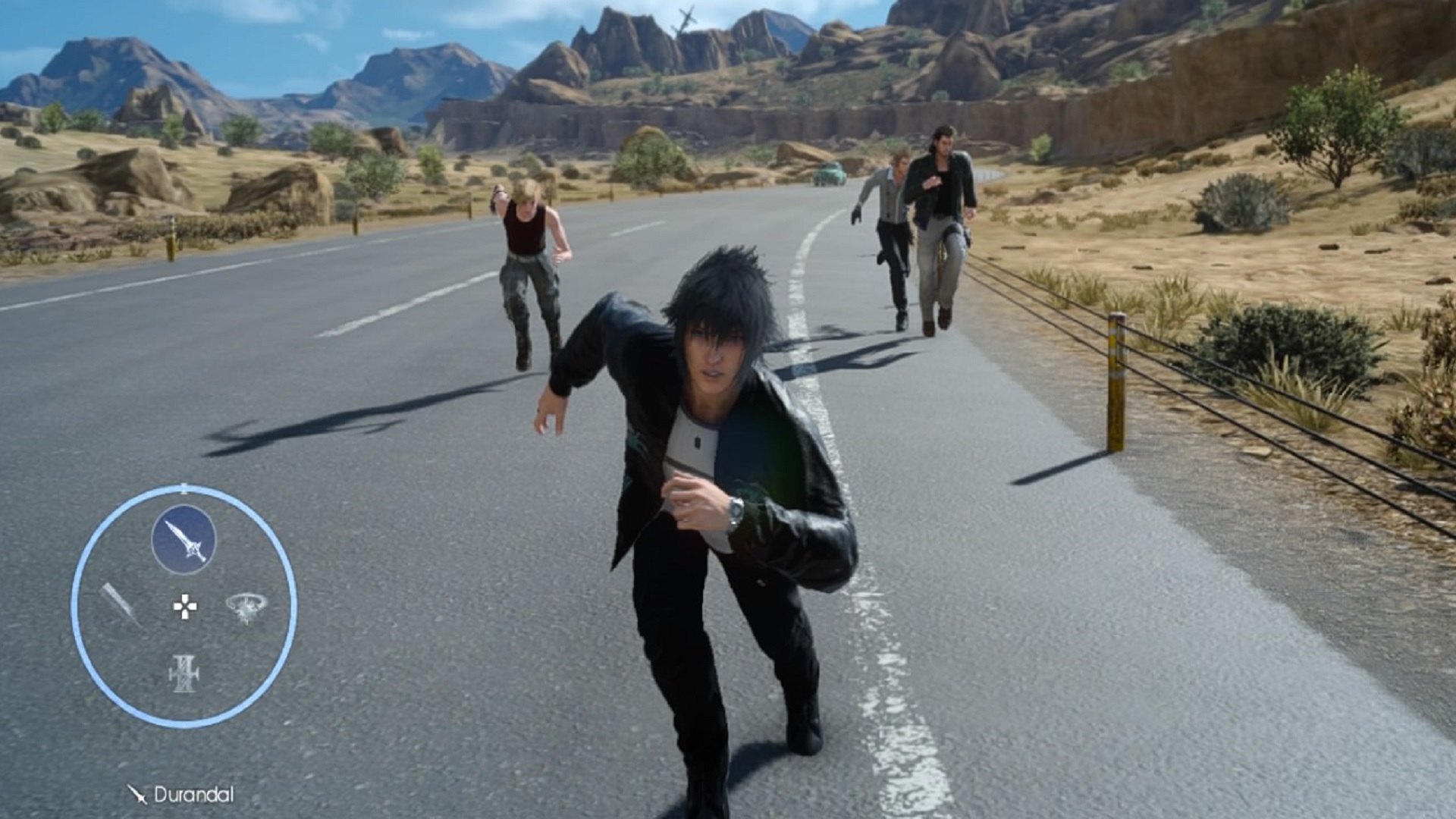
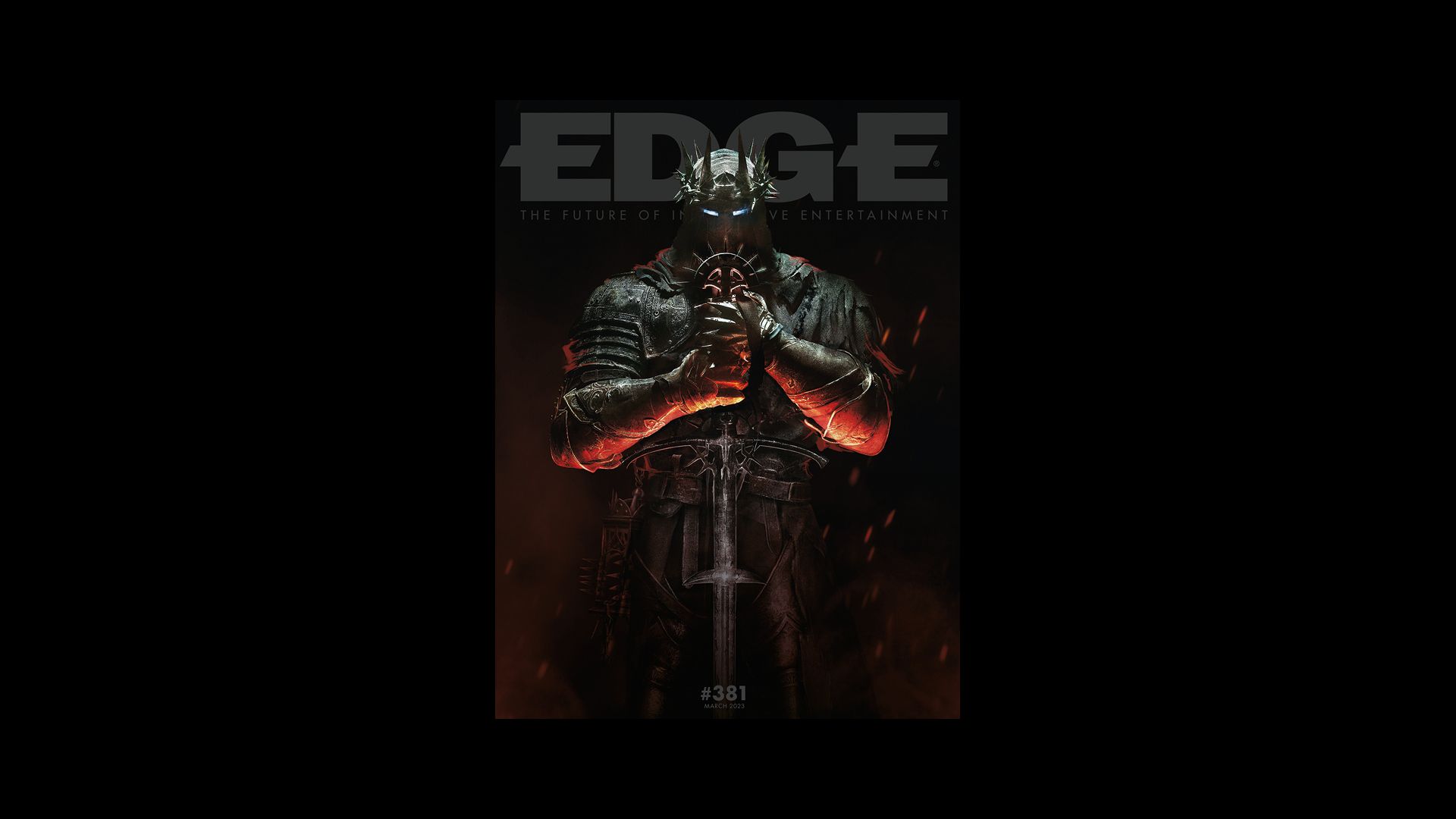
This feature originally appeared in Edge Magazine. For more fantastic in-depth interviews, features, reviews, and more delivered straight to your door or device, subscribe to Edge.
To an extent, this was inevitable, given the game's difficult gestation. Originally conceived as Final Fantasy Versus 13 some ten years before it saw the light of day, during development it expanded, mutated, became a mainline series entry, outgrew PS3, changed engine, and had a change of director. Trailers for Versus 13 before the rebrand reveal many of the components that appeared in 15: Noctis and his entourage, a mix of 'real-world' architecture and techno-fantasy, the invasion of Noctis' kingdom and his cross-country road trip to unite with his betrothed, Lunafreya. But the project would be trimmed down – including the axing of an opening act which depicted this precipitating invasion – in an effort to prevent an even later birth.
While careful, surgical cuts can certainly lead to a tighter final product, in this case the operation to save Final Fantasy 15 left large, visible scars. Your journey across the land of Lucis and beyond ping-pongs from varnished shine to placeholder coarseness, occasionally even within the same scene. The quality is mainly front-loaded into an open-world adventure which culminates in the spectacular water city of Altissia, where Lunafreya awaits. The first half of the game makes hay with the act of cruising quiet highways in the Bentley-like Regalia, gasping at sights – a huge arching rock bridge that brushes across the horizon, for example – then hopping from the car to explore on foot.
Yet even here this 'fantasy based on reality' doesn't fit together. The opening area, with its strained rural southern US overtones, presents a caricature of a culture, spaces filled with classic booth diners and twanging country tunes, with no sense that they gel with a wider geography or technology. The same might be said of Lestallum, the country's largest town, where an idyllic tropical tourist spot chokes under a smoke-spewing power plant. Lucis is full of holiday-snap views, but they don't add up to a complete picture.
The charm of the principal cast thus has to act as a binding agent. At first it seems fool-hardy that Square Enix would throw all its eggs in one basket, introducing its full playable cast from the start as a static party, with no new faces to mix things up down the line. It's a very one-dimensional group, too, with its quartet of young white men certainly not offering something for everyone, other than a range of broad personality archetypes: mopey hero, goofy sidekick, beefy guardian, nerdy strategist.
Sign up to the GamesRadar+ Newsletter
Weekly digests, tales from the communities you love, and more
But serving up a gang of already firm (and likeable) friends turns out to be Final Fantasy 15's smartest narrative stroke, tossing aside the stale conceit of disparate strangers combing for a common cause to centre on existing bonds. The tone is set in an opening full of boyish excitement, wrapped in a cover version of Ben E King's Stand By Me that can't help but remind you of the film of the same name. While Noctis and co may be older than the kids in Rob Reiner's coming-of-age drama, they're similarly naïve and awestruck by the world.
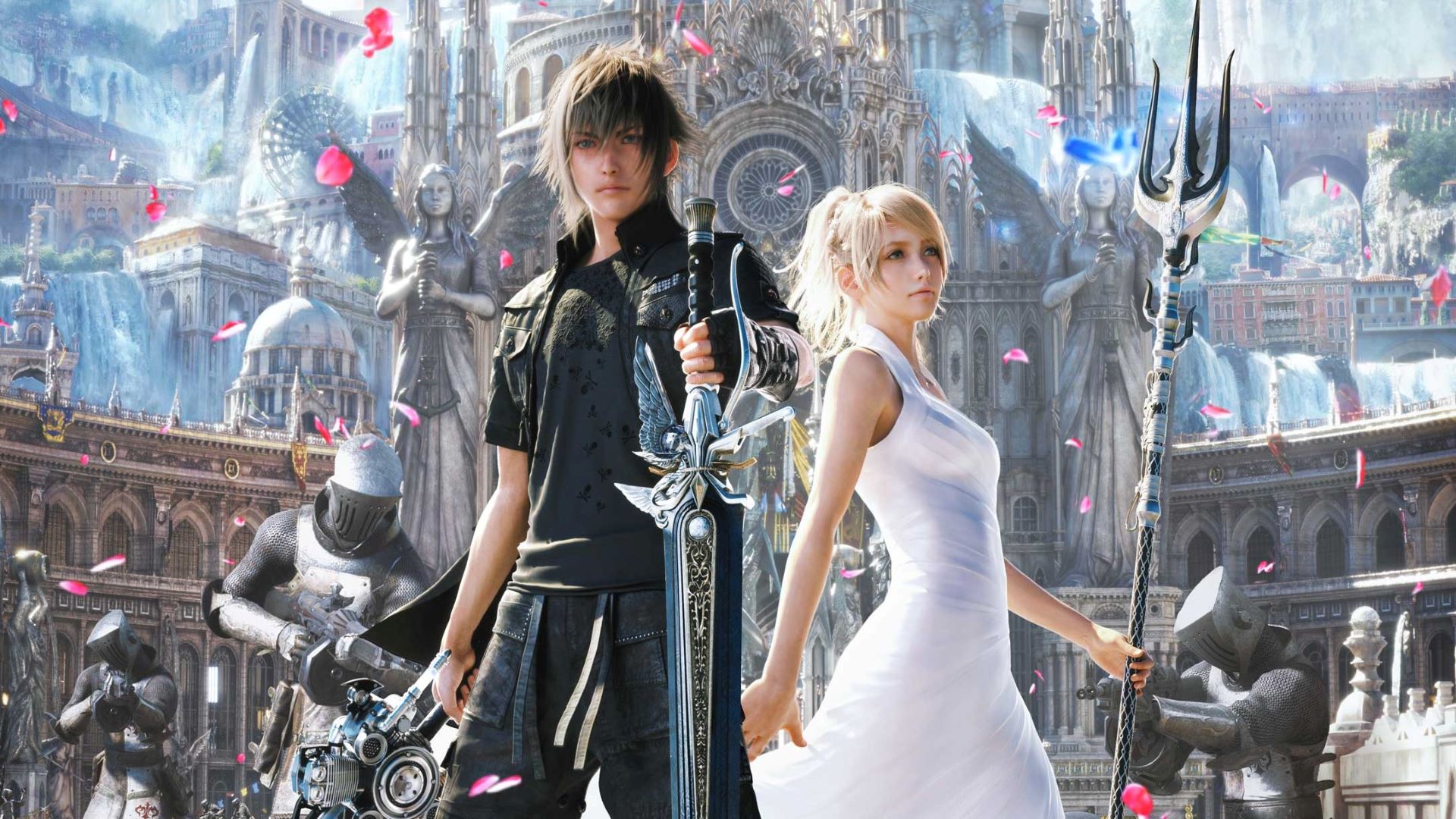
With the initial aim of travelling to Noctis' wedding, what follows is a long stag weekend of camping, hunting, fishing and chocobo riding. Sure, there are things you must do in order to move the plot forward: battling through tombs to retrieve magic weapons, and infiltrating Niflheim Empire strongholds. But it's the little moments – such as angling at the edge of a lake patrolled by dinosaurs – that hold firm in the memory. And no game has made setting up camp for the night such a vital experience. Gladiolus hammers the tent pegs in. Ignis gets dinner ready. Prompto shares his latest photos. Given the advancing threat of the Empire, it's absurd that there's room for this, but it captures the essence of a bunch of kids enjoying a last carefree fling as they're propelled towards grave responsibility.
Then again, this downtime only gets so much attention because the major events that would normally punctuate a grand RPG have been so conspicuously amputated. For instance, the gang only learns of the fall of their city, Insomnia, and the assassination of the king, when they read the morning papers. Rather than a postmodern subversion of RPG storytelling, though, this feels like a cost-cutting exercise. A cutscene tinged with shock and sadness segues into a detour mission to return to the city to verify what's happened, then it's back to the holiday. Subsequent chapters then interrupt your fun with the appearances of politicians and army commanders that you don't know from Dave.
Yes, you could watch Kingsglaive, the CGI movie released ahead of the game that details the background to the invasion and gives more screen time to these players. Yet that too feels like a desperate measure to catch the spillover from the main game. Kingsglaive doesn't so much add texture and context to the story (which the animated series Brotherhood, another 15 multimedia spin-off, does more successfully) as it does fill in gaping holes. It's especially incongruous since every time you load up the game, a message appears claiming this is 'A Final Fantasy for fans and first-timers'. Because nothing says 'for first-timers' more than having to track down separate films and TV shows to complete the plot.
The hole thing
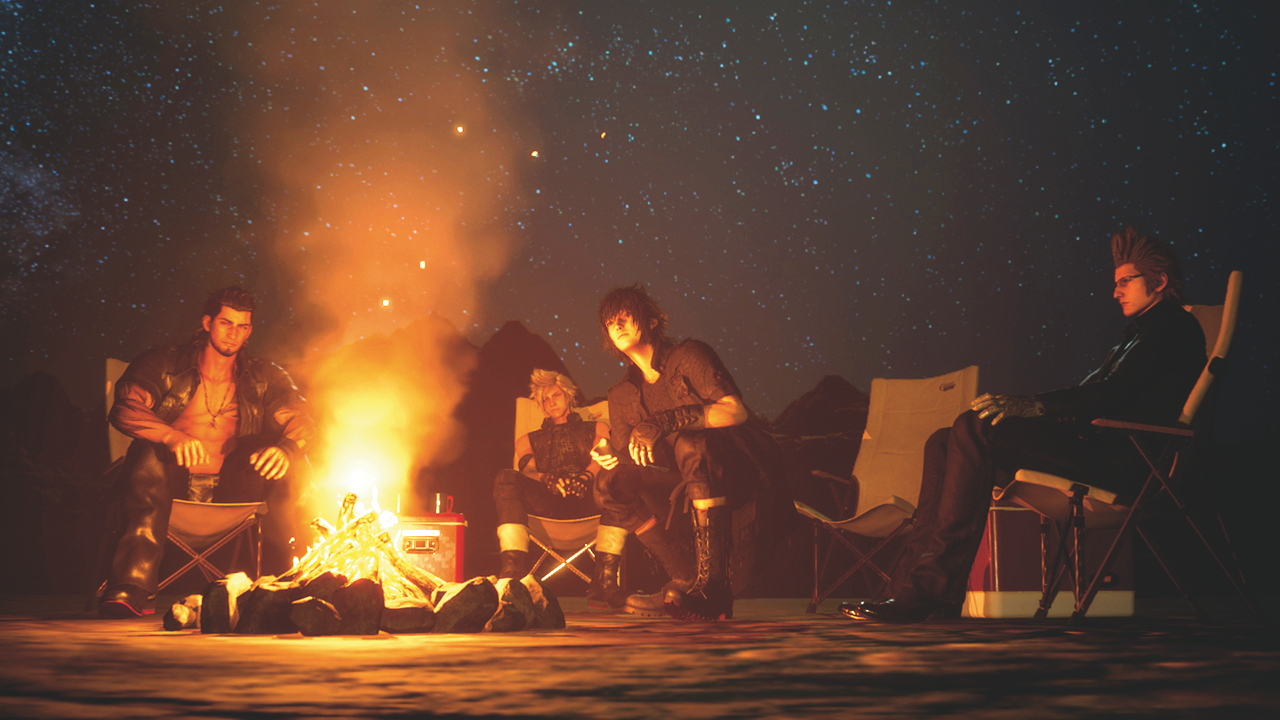
"Again, it's the entourage that comes to the rescue, plastering over the cracks with solo excursions that branch off from Noctis' story."
The biggest hole is still to come, though, after you reach Altissia in chapter nine (of 15) and Noctis' love story with Lunafreya is brutally pruned before it's had a chance to bloom. From here, the great adventure turns into a three-chapter train ride – from open world to the very definition of linearity. You do make a few stops along the way, to wade around a swamp and scuffle with Niflheim soldiers and daemons. But as vast expanses of open country roll past the carriage windows, it's clear that you're being pushed through a series of stapled-together snippets from an original vision that would surely have had you out there exploring at your leisure.
By this point in the tale, the world is succumbing to darkness, and it seems as though the game is collapsing in on itself. Not only is it dull, it's a betrayal of what has gone before – the reward of any open-world adventure is surely an opening up, rather than a contraction, as you progress. Indeed, there's a sense of sheepish recognition as a contrived mechanism involving Lunafreya's dog lets you return to Lucis before the devastation. But the holiday spirit has gone, and no amount of nostalgia can claw back what's been abandoned. There's some irony as you sit on the train contemplating how the game has gone off the rails.
Still, this sequence of chapters has been redeemed somewhat after the fact, thanks to the DLC episodes. Again, it's the entourage that comes to the rescue, plastering over the cracks with solo excursions that branch off from Noctis' story. Jarring gaps in the original version – not least the event of Ignis going blind in Altissia, which profoundly affects the group dynamic – are now filled with content. In fact, the episodes show us what we've been missing: focus on key events and backstory for our crew, and welcome variety during more linear sequences. Well, not so much in Gladiolus' episode, which is largely an extended dungeon romp, but both Prompto and Ignis are given plenty to do and generous slices of plot to chew through. In particular, Prompto's snow-bike chases and third-person shooter combat show how the game may have gotten away with narrowing down if it had made more of each character's abilities.
What these episodes and other additions in 2018's Royal Edition can't do, however, is complete the game. Nor can they rescue what is ultimately a dreary plot arc about royal bloodlines and prophecies. When it comes to its world-ending threat, you may even conclude that Final Fantasy 15 could have been trimmed down further. Perhaps the tale would have worked better if Noctis and friends really did simply go on a stag holiday, maybe stirring up resentment among the country folk, and getting caught up in some local conspiracy. Perhaps Dave could have been the villain of the piece. Then again, perhaps we should cherish what we did get, warts and all. How often nowadays does a game of this stature feel so improvised, so unusual, and so impossible to repeat?
This feature originally appeared in Edge magazine issue 384. For more fantastic features, you can subscribe to Edge right here or pick up a single issue today.
Jon Bailes is a freelance games critic, author and social theorist. After completing a PhD in European Studies, he first wrote about games in his book Ideology and the Virtual City, and has since gone on to write features, reviews, and analysis for Edge, Washington Post, Wired, The Guardian, and many other publications. His gaming tastes were forged by old arcade games such as R-Type and classic JRPGs like Phantasy Star. These days he’s especially interested in games that tell stories in interesting ways, from Dark Souls to Celeste, or anything that offers something a little different.


